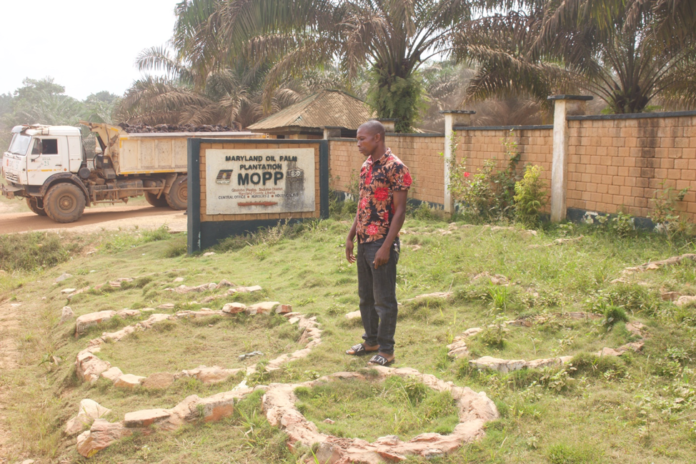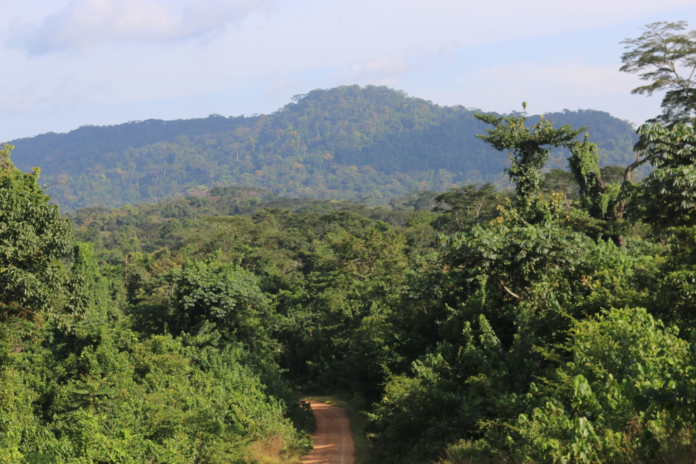Top: Saturday Wilson has defended his farmland against the Maryland Oil Palm Plantation (MOPP) for nearly 13 years. The DayLight/James Harding Giahyue
By James Harding Giahyue
PLEEBO, Maryland County – One day in 2016 policemen arrested Saturday Wilson at his farm. Wilson had been accused by the Maryland Oil Palm Plantation (MOPP) of stealing fertilizers, a court document shows.
Wilson spent two days in a police cell and after a relatively short case, the Pleebo Magisterial Court sentenced him to three and a half months in prison. It said he prevented the company from clearing the land the government had leased to it.
“I told [the judge], ‘For me, I am not embarrassing the concession but that is my land,’” Wilson tells The DayLight at his home in Gewloken in the Gbolobo Chiefdom of Pleebo Sodoken District.
“I will serve my sentence but when I come, the land will remain there. I will meet it there. It will still be for me.”
That was not Wilson’s first ordeal with MOPP, and not his last either. In the last 13 years, the 47-year-old farmer has been embroiled in a battle with the company over his farmland. It has placed him behind bars three times. However, he still owns the land.
MOPP had come to Pleebo in 2010 and began clearing some 15,200 hectares of land ahead of its agreement with the Liberian government. Many people, including some of Wilson’s relatives, lost their villages, farmlands, ancestral graveyards and shrines. The following year, MOPP signed an agreement worth US$203 million for 25 years, stretching as far as Grand Kru.
But Wilson would beat all odds to defend the remaining portion of his ancestral land. His family and the people of Gewloken had lost a huge swathe of land to Decoris Oil Palm Company, a previous Ivory Coast-based firm that operated in that region from 1980 to 1987. As a matter of fact, MOPP inherited the ruins of Decoris’ plantation as the result of Liberia’s first and second civil wars.
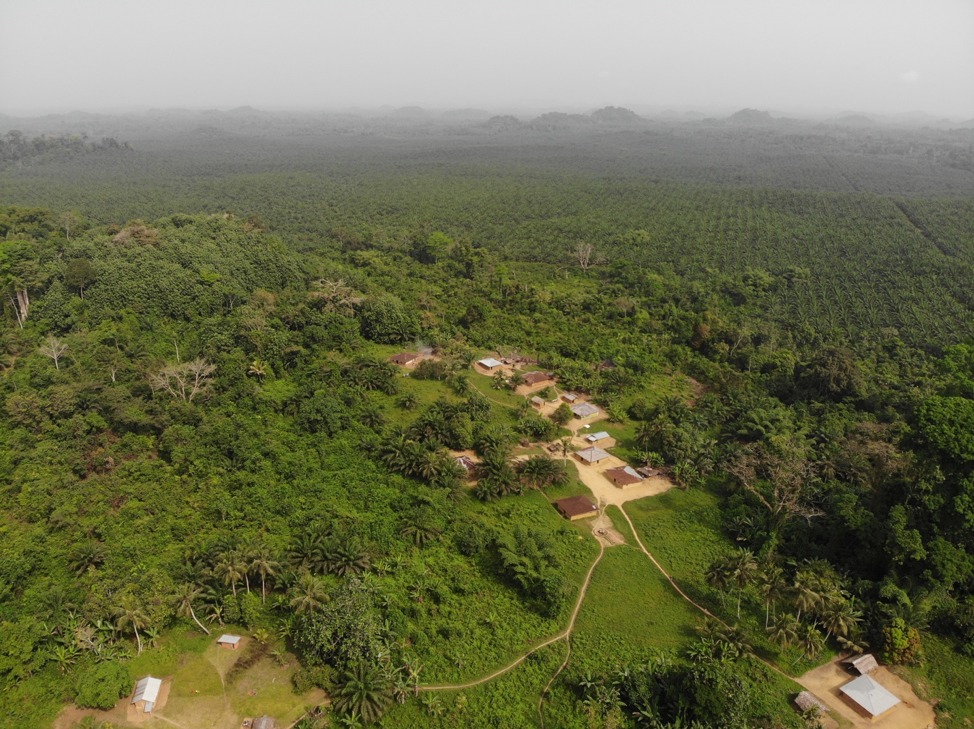
Wilson was a teenager back then but still remembers how Decoris wiped out his Gewloken town. Several generations of the Wilson clan had lived on the land as far back as the 1800s when Maryland was a territory in Africa. In 1978, tribal chiefs and elders presented the family with a paper for the land, seen by The DayLight. In those days, customary land rights were not recognized but people were issued tribal certificates as a process leading to a formal title. Decoris, however, did not recognize that document.
Now a full-grown man, Wilson could not afford to lose an inch of the land once more. “As a child when you coming up that land becomes part of you,” says the father of six.
Wilson’s first encounter with MOPP happened in October 2010. MOPP had sent workers to clear land they claim is part of its concession area. They destroyed banana shrubs and rice stalks on his farm. Still haunted by memories of Decoris’ land grab, Wilson was furious. A scuffle ensued, with men from Gewloken joining the fray.
Then the police arrived on the scene.
“They went and arrested us, we were 16 persons, took us to Harper,” Wilson recalls. “So, after two days we were released.”
After that encounter, Wilson and MOPP tried to resolve their issue but it would only lead to more tension. Bowing to pressure from some of his relatives, friends and local officials, Wilson agreed to give up his land with the agreement that MOPP would compensate him for his crops. In 2015, MOPP counted some of the crops on his farmland but abandoned the process after the first day, according to Wilson. His half-torn handwritten record of the count shows 2,259 plantain shrubs, 327 palm trees and 25 pineapple plants.
Though frustrated over the failed crops compensation deal with MOPP, Wilson remained calm. In fact, he regretted having agreed to give out the land in the first place. Nearly all of the people who started the advocacy with him five years ago had given in. The ones in MOPP’s employ complained of alleged bad labor practices, including low wages.
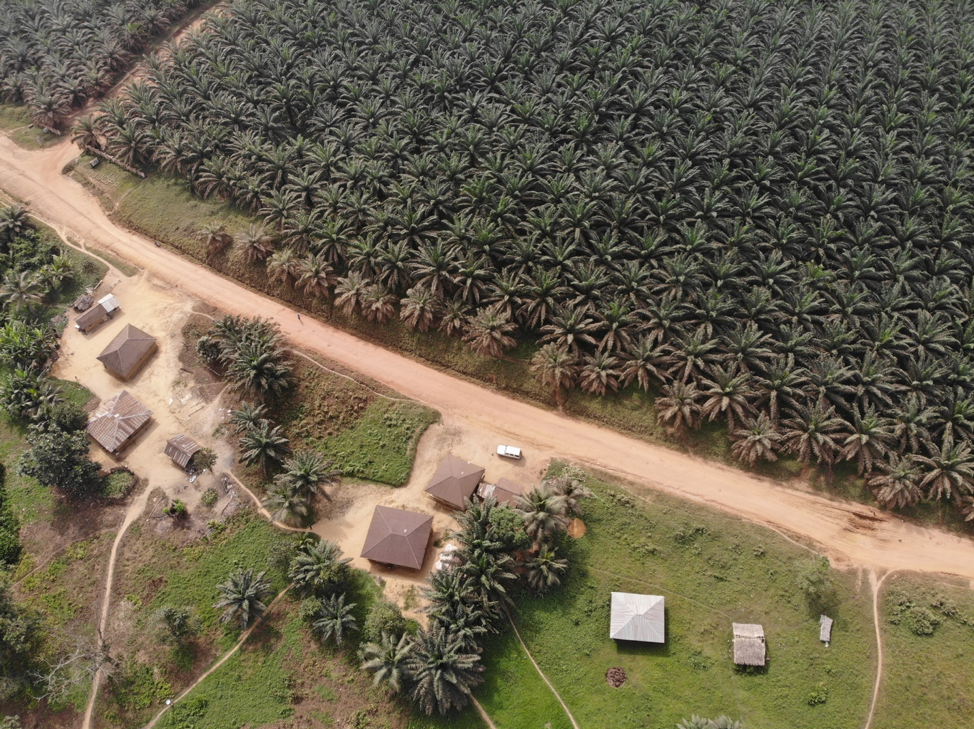
“I wanted to compromise with them… because of the tension,” Wilson says. “I am looking at other things to come. It’s better to maintain my piece of land than to work with the company. So, I am not willing to give it.”
After Wilson returned from prison, he sought permission from the court to get back to his farm.
The court arranged a hearing between Wilson and the company’s legal team. Then came the big news: MOPP told the court they had no land case with him, according to Wilson. The DayLight could not verify that claim. Wesley Kortor, the magistrate of the Pleebo Magisterial Court said it could not locate the case file due to a burglary incident. Efforts to obtain the documents from MOPP and Wilson did not materialize.
Wilson returned to his farm, happy that his struggles with MOPP were over, but his celebration would be short-lived once more. On Friday, June 8, 2018, MOPP workers made away with 180 bunches of palm nuts Wilson had harvested. He filed a complaint with MOPP’s community liaison committee, a body set up by the company to look into community grievances. It has been crucial in restoring calm to the region after MOPP’s controversial deal with the Liberian government.
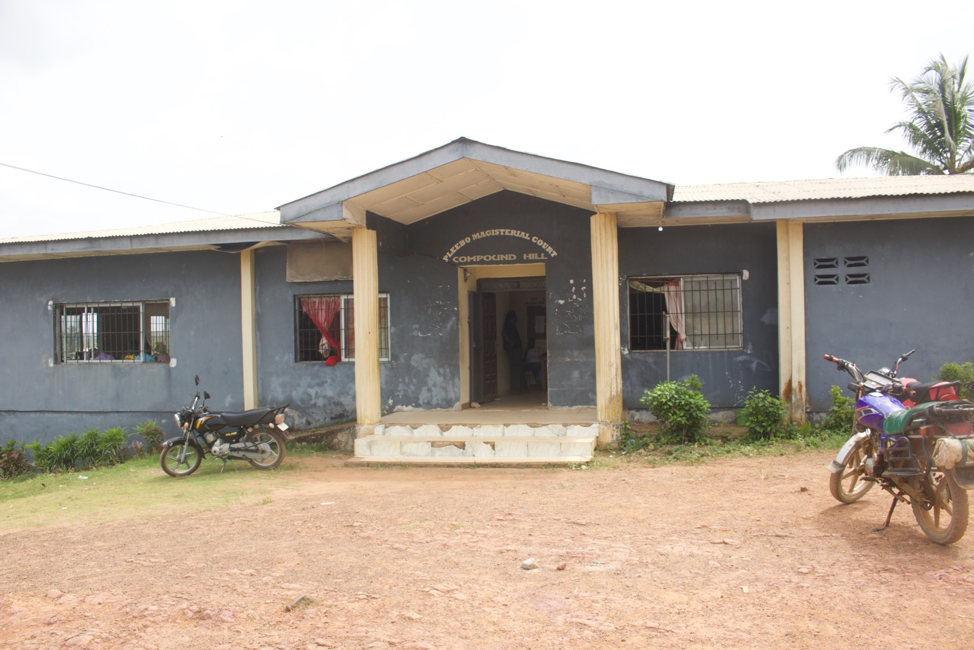
“I am therefore using this medium to register these cases to your office and request your timely intervention and [a] peaceful resolution,” Wilson said in the complaint to Olando Karbeh, the chairperson of the committee. He was citing an incident just a month before where an MOPP staff took 40 of Wilson’s palm bunches, according to his handwritten letter featuring witnesses from the company, seen by The DayLight.
Kouakou Bah, MOPP’s general manager at the time, accused Wilson of harvesting the palm nuts on MOPP’s side of their boundary. During the proceedings, Wilson argued that MOPP unilaterally demarcated boundaries. (Communities’ participation is a key concept in the global oil palm industry.) An investigation by the community liaison committee and county officials found Wilson was right, according to Karbeh. However, MOPP did not return Wilson’s harvests nor gave him any compensation. After that controversy, Wilson planted plantain trees on the widely accepted boundary between his 25-acre farm and the plantation to avert any future harvest rows.
While that move has protected his estimated 2,000 palm trees, his relationship with MOPP has remained frosty within the last six years. In a meeting late last year with county officials and citizens, MOPP representative complained about Wilson’s farmland, people, who attended the meeting, say.
“In the meeting, they said they were having problem with Saturday Wilson,” says Thomas Wilson, his brother and paramount chief for the Klebo Chiefdom under which Gewloken falls.
“The City Mayor in Pleebo Wellington Kyne came out and said ‘Saturday is not with us in here… maybe he has something to say.’
“I said in the meeting that the land that Saturday has is not even for him. It is for the.. Gewloken community,” Thomas Wilson adds in an interview at his home. Kyne corroborates his account in a phone interview.
The Community Liaison Committee has asked MOPP to resolve its conflict with Wilson more than once but the company declined, says Karbeh, calling for an end to more than a decade of hostilities.
It does not stop there. MOPP has refused to recognize him as a local palm farmer, also called a smallholder or an out-grower in the industry worldwide. The Maryland Oil Palm Outgrower Association has disclosed MOPP would begin purchasing local farmers’ harvests soon but Wilson is excluded, despite being a member of the group. He sells his harvests to Sopalm, a company more than 40 kilometers away in the Ivory coast, based on a receipt seen by The DayLight. He fears it would not change even if local farmers begin selling to MOPP.
Kwia Nelson, the president of the association, says MOPP is retaliating against Wilson. “It seems to be that human being heart will never leave things, so MOPP looks at it that the area is still for the company so at the end of the day they don’t want to do business with him,” Nelson tells The DayLight in an interview at his home in Pleeboy City.
“That is the information I have gathered as head [of the association].”
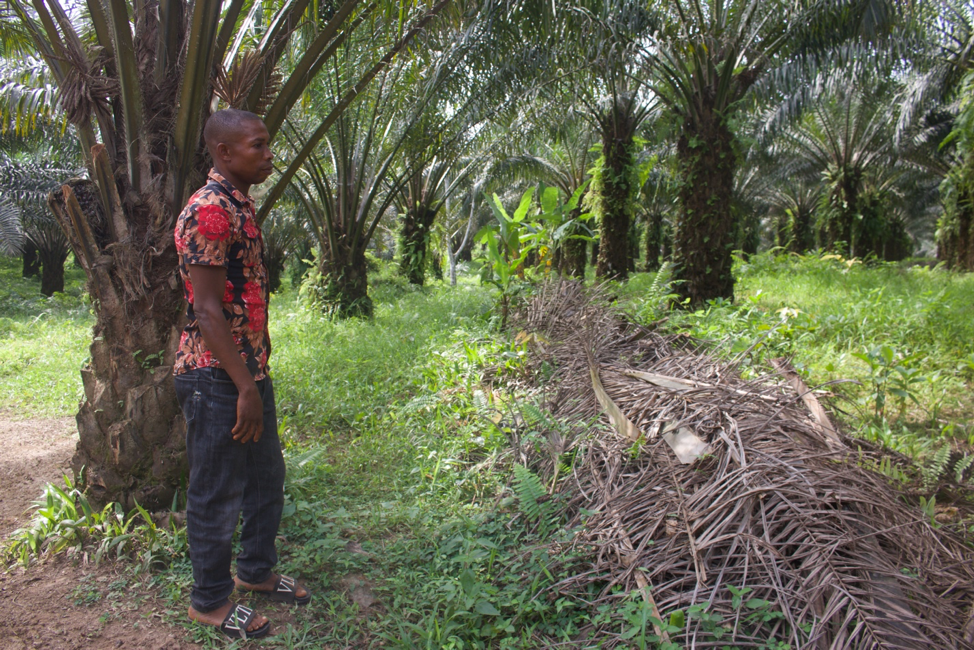
Outgrowers are crucial to MOPP’s concession with Liberia and the Roundtable on Sustainable Palm Oil (RSPO), which sets the standards for the global industry. The concession agreement requires MOPP to buy outgrowers’ palm bunches at a set price and quality, among other things. The RSPO mandates its members to include smallholders in their development plans. Is one of seven principles the watchdog operates on. MOPP is Owned by the SIFCA Group, an Ivory Coast-based firm owned by the Singaporean multinational Wilmar International, a member of the RSPO.
James Otto, a lead campaigner at the Sustainable Development Institute (SDI) that advocates for the rights of communities adjacent to the plantation, praises Wilson for defending his rights. Otto says Wilson’s ordeals discourage smallholder farming but show that people can stand up against powerful investors.
“Saturday needs to be a hero,” Otto tells The DayLight in Monrovia of Wilson, who is captured in a new report by SDI. “I call him the hero of the southeast.”
MOPP did not respond to a set of questions The DayLight emailed to them nearly two weeks ago.
Funding for this story was provided by the Green Livelihood Alliance (GLA 2.0) through the Community Rights and Corporate Governance Program of the Sustainable Development Institute (SDI). The DayLight maintained complete editorial independence over the story’s content.

